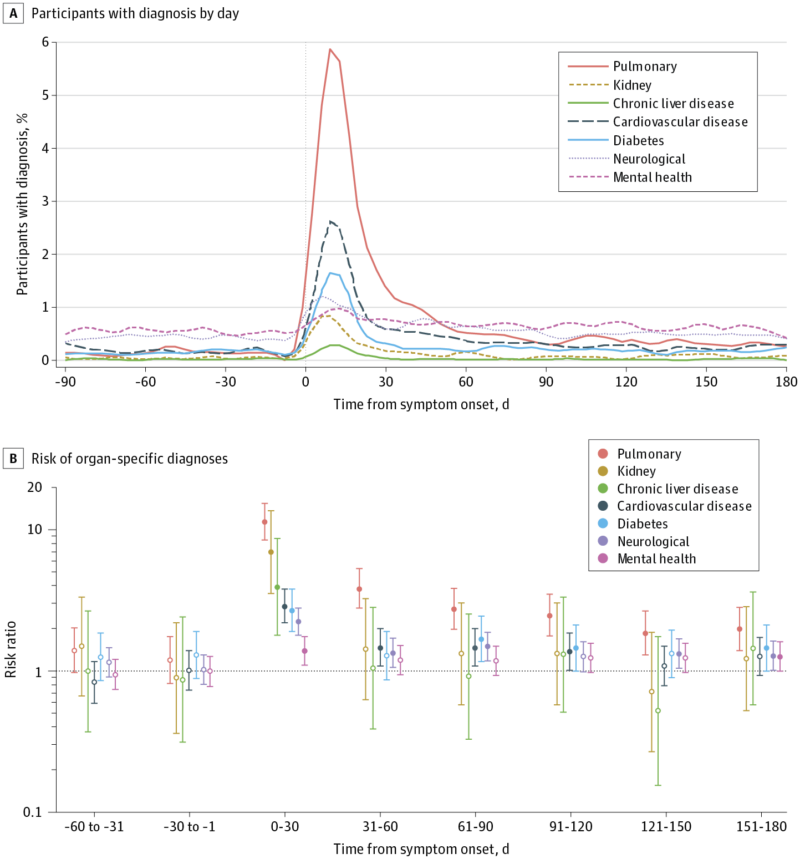Vaccine Mandate Rescinded Last Month

Click to Enlarge: Filled circles indicate P < .05; open circles, P > .05; and whiskers, 95% CIs. Source: JAMA Network Open
WASHINGTON, DC — DoD officially rescinded the COVID-19 vaccine mandate for servicemembers last month. Even though President Joe Biden and DoD leaders opposed the move, the administration was forced to choose between ending the mandate or having Republican lawmakers in the House hold up the $816 billion National Defense Authorization Act (NDAA) for fiscal year 2023.
The defense spending bill was signed into law on Dec. 26 and contained a provision requiring DoD to lift the mandate.
The question remains what will happen to the 8,400 servicemembers discharged for refusing to receive the vaccine while the mandate was in effect August 2021 to December 2022.
During congressional debate over the NDAA prior to its passage, Sens. Ron Johnson (R-WI) and Ted Cruz (R-TX) submitted an amendment that would have reinstated servicemembers who were discharged solely for refusing to take the vaccine; provided back pay and changed their separation status to honorably discharged; and prohibited DoD from issuing any future COVID-19 vaccine mandate without congressional authorization. The amendment failed to pass by a vote of 40-54.
In his opposition to the amendment, Sen. Jack Reed (D-RI) said, “I think we’ve forgotten where we were before the vaccine. For example, the USS Theodore Roosevelt, one of the most-important aircraft carriers in our fleet and particularly in the Pacific, was effectively put out of commission when 27% of her crew were infected with COVID-19. Hundreds were hospitalized. The carrier had to dock in Guam for two months. For two months, we did not have the striking power of an American aircraft carrier in the Pacific.”
Reed went on to note that, following the vaccine mandate, there were no repeat incidents of that magnitude.
Republican legislators have continued to urge the military to reinstate discharged servicemembers, and stories began circulating last month that DoD officials were contemplating reinstatement and back pay. During a press conference at the Pentagon, however, Air Force Brig. Gen. Patrick Ryder quashed those rumors.
“We are not currently pursuing back pay to servicemembers who were dismissed for refusing to take the COVID vaccination,” Ryder said. “At the time those orders were refused, it was a lawful order, and so I’ll just leave it at that. … I’m not going to speculate on what the future might portend.”
Many of the Republicans who worked to strike down the mandate said that it had a direct impact on military readiness, and that the services’ failure to meet recruitment goals last year was, at least in part, a result of the mandate. They also argued that, with recruitment lacking, the military could not afford to lose the 8,400 servicemembers discharged for failure to comply.
Studies suggest that the long-term effects of COVID-19 infection will have their own impact on readiness, however. A study conducted by researchers at the Uniformed Services University of the Health Sciences found that COVID-19 is associated with long-term effects on the physical fitness of servicemembers.
In the study, approximately one-third of people who contracted COVID-19 reported increased difficulty with exercise and daily activities one month post-diagnosis. Over one-third reported a negative impact on physical fitness test scores one year after infection.
The same USUHS research team also found that vaccinated servicemembers reported a shorter course of acute illness.
“Participants who were vaccinated prior to COVID-19 onset were significantly less likely to report 28 or more days of illness,” the researchers stated in JAMA Network Open last month. “Vaccination after onset was also associated with a lower risk of reporting symptoms at six months after symptom onset.”1
Participants who contracted COVID were more likely to seek medical care for diabetes, pulmonary, neurological and mental health-related illnesses for at least six months after onset. According to the research team, these findings represent a “substantive burden of medical care utilization after COVID-19,” regardless of a patient’s health prior to infection.
“These findings may inform the risk-benefit ratio of COVID-19 vaccination policy,” they noted.
- Richard SA, Pollett SD, Fries AC, et al. Persistent COVID-19 Symptoms at 6 Months After Onset and the Role of Vaccination Before or After SARS-CoV-2 Infection. JAMA Netw Open. 2023;6(1):e2251360. doi:10.1001/jamanetworkopen.2022.51360

